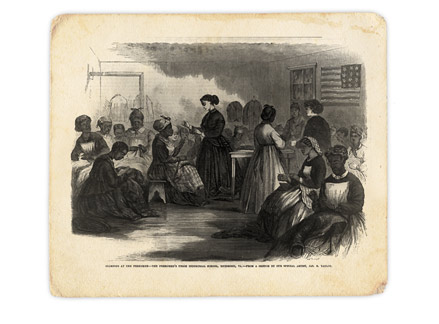


A Powerful Legacy for Black Education
by Catherine Gianaro
Intro
| Determined to be Literate
| A Change in Perception

![]()
Determined to be Literate
Many scholars, including W.E.B. Dubois, have described different groups emerging from slavery, bondage or peonage throughout human history. And throughout history there has never been a group emerging from slavery, bondage or peonage that responded to freedom the way African Americans did, Butchart said. “Many peoples came out of bondage believing that their folk knowledge was superior to the formal knowledge of the master class, while other groups came out believing they were unworthy of their former masters’ ways of knowing. When African Americans were freed from slavery, they took a different stance: They were determined to be literate, to know everything the white man knew.”
Blacks saw literacy as an essential element of freedom, he said. They understood that those who had power in the pre-war South — that is, rich whites — were literate, while poor whites were not.

“We have story after story from teachers, who would write, ‘I’m simply amazed at the speed with which these [black] children learn. They learn faster than white children and their hunger for education is greater than anything I’ve ever seen,’” Butchart said.
He admits that this finding challenges the argument that black education needs a culturally relevant curriculum — one that uses more examples from urban life or is more Afro-centric.
“In many ways I empathize with and understand that position, but the group of black children who came into the schools in the 1860s was more culturally isolated from mainstream white society than the black community has ever been since,” he said. “For some children coming out of slavery, the only white person they’d ever seen was the overseer or the master. They could not even observe the norms of white society from a distance.
“When they went into the schools, they were given a curriculum that was oppressively Victorian,” he added, “and yet those students mastered that curriculum at a prodigious rate.”
Some of Butchart’s colleagues still endorse the idea that today’s black students would be more successful if attention were paid to the cultural gap. “And although I believe that,” he said, “I can point to a time when the cultural gap was nearly unbridgeable, yet the black students bridged it.”
Intro
| Determined to be Literate
| A Change in Perception
For comments or for information please e-mail: rcomm@uga.edu
To contact the webmaster please email: ovprweb@uga.edu
![]()